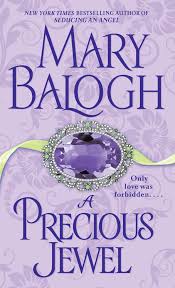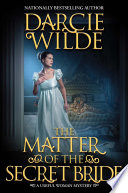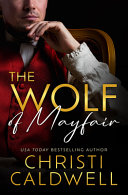
When a writer warns you in the foreward to expect the unexpected. it can make you hesitate to take the plunge. But trusting Mary Balogh as a solid author, I simply shrugged and dove in to this slim re-release.
As Balogh explains, the book is a departure from her traditional Regencies. The hero is really more of a second tier character (he is not terribly rich, handsome, smart, or rakish), and the heroine is a genteel gal fallen on hard times. Yep, she is a pro.
Here is how Balogh explains the book: “This is the book of mine that seemed impossible to write but had to be written. Sir Gerald Stapleton was a minor character in The Ideal Wife and was forever lamenting the loss of Priss, his long-term mistress, who had left him to marry someone from her past. I found myself not only fascinated by that relationship—Gerald had taken Priss from a brothel to be his mistress—but also obsessed by it. I couldn’t stop thinking about it and weaving a story about it—and dreaming up a reconciliation and happy ending for them.
The problem was obvious. I was writing traditional Regency romances at the time, and it was clearly impossible to use a working prostitute as a heroine. And Gerald himself was a beta male, not the dashing, rakish rogue so beloved of Regency readers.
But the story would not leave me alone. I finally wrote it—it took me two weeks!—and shelved it for a while. No one would ever publish it. It had been written for my own satisfaction. But one day I sent it to my editor anyway, just to see how she would react. She reacted by sending it straight through to copyediting! And when it was published, it became a reader favorite.”
Gerald is the quintessential beta male. He really isn’t even terribly likable. He’s very average, and even a bit pitiful at times. Granted, as the story unfolds we learn of some very deep seeded issues that have made him who he is. And it is through his relationship with Priss, his steady “date” then mistress, that he learns to let go.
Prissy, on the other hand, is a people pleaser. I am sure those of you interested or schooled in psychology will have a field day with her. But her less obvious issues seem to make a perfect foil for Gerald, and for some reason she can’t help but fall almost immediately in love with him.
The sex is for the most part quick and not very in depth, more mechanical than anything. And I think its this coupled with the very quiet beauty of a blossoming romance that makes this book a “reader favorite”.
This is not an escapist romance. It reminds me more of contemporary romance, set in history. Our hero and heroine have problems, conflict, and a very gritty relationship. He is a lousy communicator and she is self-sacrificing. Sounds like a lot of real relationships I know.
Which is to say, that for those who like their light-hearted romps steer clear.
I have always admired Balogh for her left-of-center heros and heroines and think this book is a natural addition to her collection of imperfect characters that you end up cherishing. It brings to mind Freyja from Slightly Scandalous who is mouthy, “handsome” rather than beautiful, and entirely too nutty to end up hooking up with the handsome Marquess of Hallmere (which she does). The thing is, to me, Freyja is up there with memorable hist-ro heroines…right beside Whitney (from Judith McNaught’s Whitney, My Love), Josephine (from Eloisa James’ Pleasure for Pleasure), Cathy (from Jane Austen’s Northanger Abbey) and Arabella (from Georgette Heyer’s Arabella).
I wouldn’t go so far to say that Prissy will stick out in my heart and mind as part of that top five list, but I will say that Balogh is the Queen of the Romantic Underdog. And those of you readers who are devoted to unlikely lovers will enjoy A Precious Jewel for that very reason.








